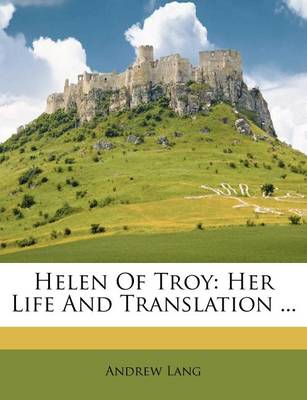Scottish writer Andrew Lang is best remember for his prolific collections of folk and fairy tales, but he was also an accomplished poet, literary critic, novelist and contributor in the field of anthropology. In Lang's Helen of Troy, a story in rhyme of the fortunes of Helen, the theory that she was an unwilling victim of the Gods has been preferred. Many of the descriptions of manners are versified from the Iliad and the Odyssey. The description of the events after the death of Hector, and the account of the sack of Troy, is chiefly borrowed from Quintus Smyrnaeus. The character and history of Helen of Troy have been conceived of in very different ways by poets and mythologists. In attempting to trace the chief current of ancient traditions about Helen, we cannot really get further back than the Homeric poems, the Iliad and Odyssey. Philological conjecture may assure us that Helen, like most of the characters of old romance, is "merely the Dawn," or Light, or some other bright being carried away by Paris, who represents Night, or Winter, or the Cloud, or some other power of darkness. Without discussing these ideas, it may be said that the Greek poets (at all events before allegorical explanations of mythology came in, about five hundred years before Christ) regarded Helen simply as a woman of wonderful beauty. Homer was not thinking of the Dawn, or the Cloud when he described Helen among the Elders on the Ilian walls, or repeated her lament over the dead body of Hector. The Homeric poems are our oldest literary documents about Helen, but it is probable enough that the poet has modified and purified more ancient traditions which still survive in various fragments of Greek legend. In Homer Helen is always the daughter of Zeus. Isocrates tells us ("Helena," 211 b) that "while many of the demigods were children of Zeus, he thought the paternity of none of his daughters worth claiming, save that of Helen only." In Homer, then, Helen is the daughter of Zeus, but Homer says nothing of the famous legend which makes Zeus assume the form of a swan to woo the mother of Helen. Unhomeric as this myth is, we may regard it as extremely ancient.
- ISBN10 127118463X
- ISBN13 9781271184637
- Publish Date 4 November 2011 (first published 1 June 2002)
- Publish Status Unknown
- Publish Country US
- Imprint Nabu Press
- Format Paperback (US Trade)
- Pages 220
- Language English
